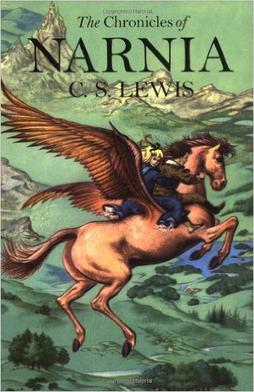
The Chronicles of Narnia is a series of seven portal fantasy novels by British author C. S. Lewis. Illustrated by Pauline Baynes and originally published between 1950 and 1956, the series is set in the fictional realm of Narnia, a fantasy world of magic, mythical beasts and talking animals. It narrates the adventures of various children who play central roles in the unfolding history of the Narnian world. Except in The Horse and His Boy, the protagonists are all children from the real world who are magically transported to Narnia, where they are sometimes called upon by the lion Aslan to protect Narnia from evil. The books span the entire history of Narnia, from its creation in The Magician's Nephew to its eventual destruction in The Last Battle.
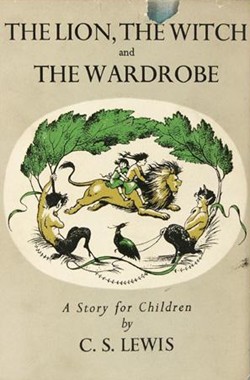
The Lion, the Witch and the Wardrobe is a portal fantasy novel for children by C. S. Lewis, published by Geoffrey Bles in 1950. It is the first published and best known of seven novels in The Chronicles of Narnia (1950–1956). Among all the author's books, it is also the most widely held in libraries. It was the first of The Chronicles of Narnia to be written and published, but is marked as volume two in recent editions that are sequenced according the stories' internal chronology. Like the other Chronicles, it was illustrated by Pauline Baynes, and her work has been retained in many later editions.

Mr. Tumnus is a faun in The Chronicles of Narnia books written by C. S. Lewis, primarily in The Lion, the Witch and the Wardrobe but also briefly in The Horse and His Boy and in The Last Battle. He is the first creature Lucy Pevensie meets in Narnia and becomes her first friend in the kingdom. Lewis wrote that the first Narnia story, The Lion, the Witch and the Wardrobe, all came to him from a single picture he had in his head of a faun carrying an umbrella and parcels through a snowy wood. Tumnus thus became the initial inspiration for the entire Narnia series.

Jadis is a fictional character and the main antagonist of The Lion, the Witch and the Wardrobe (1950) and The Magician's Nephew (1955) in C. S. Lewis's series, The Chronicles of Narnia. She is commonly referred to as the White Witch in The Lion, the Witch and the Wardrobe, as she is the Witch who froze Narnia in the Hundred Years Winter.
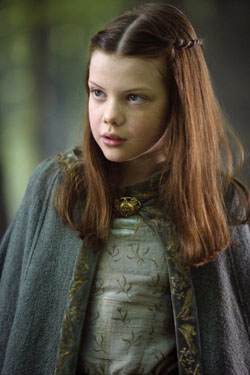
Lucy Pevensie is a fictional character in C. S. Lewis's The Chronicles of Narnia series. She is the youngest of the four Pevensie children, and the first to find the Wardrobe entrance to Narnia in The Lion, the Witch and the Wardrobe. Of all the Pevensie children, Lucy is the closest to Aslan. Also, of all the humans who have visited Narnia, Lucy is perhaps the one that believes in Narnia the most. She is ultimately crowned Queen Lucy the Valiant, co-ruler of Narnia along with her two brothers and her sister. Lucy is the central character of the four siblings in the novels. Lucy is a principal character in three of the seven books, and a minor character in two others.

Peter Pevensie is a fictional character in C. S. Lewis's The Chronicles of Narnia book series. Peter appears in three of the seven books; as a child and a principal character in The Lion, the Witch and the Wardrobe and Prince Caspian, and as an adult in The Last Battle. He is mentioned in The Horse and His Boy, in which he is away on the northern frontier fighting giants, and in The Voyage of the Dawn Treader, in which he is studying under the tutelage of Professor Kirke.

Edmund Pevensie is a fictional character in C. S. Lewis's The Chronicles of Narnia series. He is a principal character in three of the seven books, and a lesser character in two others.

The Chronicles of Narnia: The Lion, the Witch and the Wardrobe is a 2005 high fantasy film directed by Andrew Adamson, who co-wrote the screenplay with Ann Peacock and the writing team of Christopher Markus and Stephen McFeely, based on the 1950 novel The Lion, the Witch and the Wardrobe, the first published and second chronological novel in the children's book series The Chronicles of Narnia by C. S. Lewis. The film is the first installment in The Chronicles of Narnia film series. It was produced by Walt Disney Pictures and Walden Media, and distributed by Buena Vista Pictures Distribution.
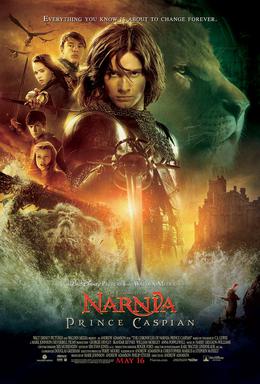
The Chronicles of Narnia: Prince Caspian is a 2008 high fantasy film directed by Andrew Adamson, who co-wrote the screenplay with Christopher Markus and Stephen McFeely, based on the 1951 novel Prince Caspian, Produced by Walt Disney Pictures and Walden Media, the second published and fourth chronological novel in the children's book series The Chronicles of Narnia by C. S. Lewis. The sequel to The Chronicles of Narnia: The Lion, the Witch and the Wardrobe (2005), it is the second installment in The Chronicles of Narnia film series.

In C. S. Lewis's fantasy novel series the Chronicles of Narnia, the hill of the Stone Table, or Aslan's How, is a high mound or cairn, located south of the Great River in Narnia next to the Great Woods. The How was built over the hill of the Stone Table. The word how derives from the Old Norse haugr, meaning hill or mound. In parts of England, it is a synonym for barrow.

The Chronicles of Narnia is a British BBC-produced television series that was aired from 13 November 1988 to 23 December 1990 and is based on four books of C. S. Lewis's The Chronicles of Narnia series. The first series aired was The Lion, the Witch and the Wardrobe in 1988, the second series aired was Prince Caspian and The Voyage of the Dawn Treader in 1989 and the third series aired was The Silver Chair in 1990. This television series was produced by Paul Stone, with the teleplay by Alan Seymour. The Lion, the Witch, and the Wardrobe was directed by Marilyn Fox, while Prince Caspian, The Voyage of the Dawn Treader and The Silver Chair were directed by Alex Kirby.
The Chronicles of Narnia is a fantasy film series and media franchise based on The Chronicles of Narnia, a series of novels by C. S. Lewis. The series revolves around the adventures of children in the world of Narnia, guided by Aslan, a wise and powerful lion that can speak and is the true king of Narnia. The children heavily featured in the films are the Pevensie siblings, and a prominent antagonist is the White Witch. The franchise also includes short films, digital series, and video games.
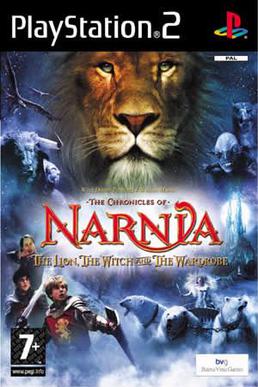
The Chronicles of Narnia: The Lion, the Witch and the Wardrobe is an action-adventure game released in 2005 by Traveller's Tales and Amaze Entertainment. The game is based on the novel-adapted movie of the same name. It was released in November before the movie for most major consoles including the GameCube, PC, Xbox, PlayStation 2, Nintendo DS, and Game Boy Advance, A version for the PlayStation Portable was planned, but was cancelled. Also in 2005, a role-playing game, a strategy game and a chess game were released for wireless phone systems by Disney Mobile. A significant feature has William Moseley, Skandar Keynes, Anna Popplewell, Georgie Henley, Elizabeth Hawthorne, and Jim Broadbent reprising their roles from the film.

Aslan is a major character in C. S. Lewis's The Chronicles of Narnia series. Unlike any other character in the Narnian series, Aslan appears in all seven chronicles. Aslan is depicted as a talking lion and is described as the King of Beasts, the son of the Emperor-Over-the-Sea, and the King above all High Kings in Narnia.
The Lion, the Witch and the Wardrobe is a British children's television drama first broadcast by the BBC in 1988. It was the first series of The Chronicles of Narnia that ran from 1988 to 1990.

Maugrim is a fictional character in the 1950 novel The Lion, the Witch and the Wardrobe by C. S. Lewis. A Narnian wolf, he is the Captain of the White Witch's Secret Police. In early American editions of the book, Lewis changed the name to Fenris Ulf, but when HarperCollins took over the books they took out Lewis' revisions, and the name Maugrim has been used in all editions since 1994.
The Chronicles of Narnia is a series of seven fantasy novels for children written by C. S. Lewis. It is considered a classic of children's literature and is the author's best-known work, having sold over 100 million copies in 47 languages. Written by Lewis between 1949 and 1954, illustrated by Pauline Baynes and published in London between October 1950 and March 1956, The Chronicles of Narnia has been adapted several times, complete or in part, for television, radio, the stage, film, in audio books, and as video games.
The following outline is provided as an overview of and topical guide to Narnia:
Magical creatures are an important aspect of the fictional world of Narnia contained within The Chronicles of Narnia book series and connected media originally created by C. S. Lewis. Throughout the seven books of the series, the protagonists encounter a variety of these creatures as they travel throughout Narnia and the surrounding lands and seas, including Archenland, Calormen, and the Great Eastern Ocean.














